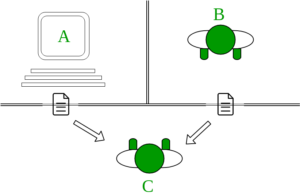 Imagine a small group of people skipping stones at the water’s edge. Are they trying to fill the sea? Are they trying to empty the beach of stones? What else could they be doing?
Imagine a small group of people skipping stones at the water’s edge. Are they trying to fill the sea? Are they trying to empty the beach of stones? What else could they be doing?
They were having fun, taking turns, competing a bit, and testing themselves against the others. Then the stone skipping stops at a random point when everyone moves on to another activity.
How would artificial intelligence process this the first time it encountered people skipping stones? Once AI has passed the point of seeming humanlike how deep will AI’s human-ness be?
The “Turing test” is used to determine if AI can think intelligently like human. AI would be considered intelligent if it’s conversation couldn’t be easily distinguished from a human’s.
 The test uses two humans and one computer, one human is isolated from other two players. All communication is text only on a computer keyboard and screen.
The test uses two humans and one computer, one human is isolated from other two players. All communication is text only on a computer keyboard and screen.
The interrogator’s job is figuring out which one is human and which one is an AI by asking questions from both of them. The computer would try to be as indistinguishable from a human as it could. The computer could lie or dumb itself down.
Once an AI passes a Turing test, how long will it be before AI really understands human behaviors such as skipping stones, making art, or trying to meet people simply because everyone carries a piece of the puzzle of life. There’re things we do that don’t appear important at the time but may be later. I don’t know if AI will be able to understand them even if it can predict them.